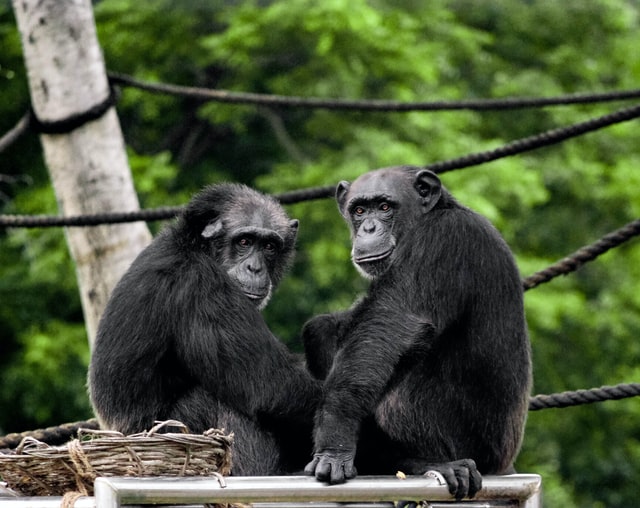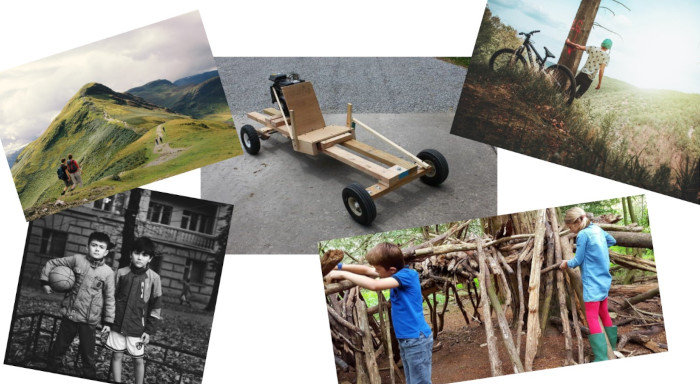Podcast 92 - Used to - structure and use
Today I'm going to be talking about used to. So this is a B1 session. I'll be talking about how we use used to for talking about events in the past. I'll talk about its structure, and more importantly, lots of examples of its use for you to listen to. Okay, so here we go.
Used to and past simple
As I mentioned in the introduction, used to is for talking about events in the past. We can say these events are repeated events, or perhaps they are long events - things that happened over a period of time. It's interesting in English, because we can do that anyway without 'used to'. We can talk about past events over a long period of time, or repeated events in the past, without using 'used to'. For example (and I'm thinking back to my childhood now),

My granddad and I went to see the monkeys in the park every Saturday.
That was because we lived near a park, and there was a sort of a mini-zoo. There were some cages - just a few animals. In fact, there were some chimpanzees and in another cage there was a huge gorilla! It was quite strange, really, because these days you usually have to pay to see monkeys or a gorilla, but these were just in cages in the middle of the park.
Anyway, the point is, that when we're talking about the past, we can just use the past simple. My granddad and I went to see the monkeys in the park every Saturday. That is a repeated event. And I could say, as well (talking about a long event in the past) that,
When I was a child, I lived in a town called Southend-on-Sea,
which was a lovely town by the sea. I lived there for many years. Now, we don't need 'used to' because, interestingly in English, the past simple can talk about single events, things that just happen once at a moment, or it can talk about repeated events or long time events. That's the complication! Because if I say my granddad and I went to see the monkey in the park and then you say, Well, did you go once? Did you just go once with your grandfather? Or did you go many times? So I have to add every Saturday. And then you realise it is a repeated event.
If we use 'used to', well then we don't have to say, every Saturday or every year or every day. So I could say,
My grandfather and I used to go and see the monkeys in the park.
And now you know that it is a repeated event because I used 'used to'.
Here are some more examples.
I used to live in Southend-on-sea when I was a child.
You get the idea that it was quite a long time that I lived there.
I used to keep a snake in a box when I was a little boy.
A snake! [sssssss] His name was Sid!
I used to be a Cub Scout.
The Cub Scouts' is a club where you dress in uniform, and you meet once or twice a week. And you do things like tying knots and identifying star constellations and all those useful things. I used to be a Cub Scout and,
We used to have a great time.
We really enjoyed it!
The structure and spelling of 'used to'
So the structure of 'used to'. It is spelt U-S-E-D when it is in affirmative sentences. But if it's in a question, be careful because you have to take off the D because 'used to' is the past tense use. If it's a question, well then it has an infinitive form. So,
Did you use to be a Cub Scout?
And 'use' id spelt there then U-S-E.
Did you use to have a job when you were at school?
Well, yes, I did! I did have a job. I used to have a newspaper round. I took newspapers to my neighbours and put them through the letterbox and I did that before I went to school, or rather before I started school. So I used to have a newspaper round.
There's another thing there before I go on. It's important to realise you don't have to repeat use to, use to, use to, all the time! If first of all, you say 'used to' at the beginning. Well, then we understand you're talking about a long period of time. So the other verbs can just be in past simple. So I'll just say that again.
I used to have the newspaper around. I took newspapers to my neighbours, and I put them through the door. I enjoyed myself, and I earned a little money too.
So I don't need to use 'used to', with all those verbs, because we know I'm talking about repeated [events] or a long time because I said 'used to' at the beginning.
Okay, let's carry on with the structure. I've got a sentence in the negative.
We didn't use to watch much TV when we were children.
'Used to' here is again in the infinitive form. Because before we have the auxiliary did. So we didn't use to is U-S-E and no D at the end.
Although you wouldn't know from the pronunciation because the to after it sort of runs into the use. It makes a liaison, we say.
we didn't use to watch much TV / I used to watch a lot of TV.
So the pronunciation is the same with or without the D at the end.
So 'used to' is a funny verb really. We have a name for it. It's called a defective verb. The 'defective' means [there's] a lot of things that you can't do with it. It doesn't have a continuous tense or perfect tense or perfect aspect. It doesn't have a present tense, even. You cannot use use to in the present. So if you want to talk about repeated actions or long actions in the present, well, it's best to say usually,
I usually do this. I usually do that.
I'll give you some more examples later. The only two parts of the verb are the past tense with D and the infinitive without D. And that's it!
'Used to' in example texts

Okay, so I'm going to talk now a little bit about a photo that I've included in the audio script of this podcast - podcast number 92 at Practising English.com. I've put some pictures there of activities that we used to do as children. And I'm going to compare those with what I see children are doing these days.
So if you look at the picture, you can see some boys walking in the hills. And that was something we did a lot when we were children - before we were a teenager, and after as well when I was a teenager too. We used to go out a lot for walks. I was lucky. I used to live in the countryside. And I can remember my mother saying to me, she used to say, make sure you're back before it gets dark. That was it! Make sure you're back before it gets dark.
In those days. We didn't worry about dangers or things that could perhaps harm us. It was all very safe it seemed - or was it? I don't know. But we didn't have any problems. And we used to get home before dark to have our tea.
Then other things that we used to do. And this is a nice thing. We used to make go-karts, and there's a picture of one with the podcast here. You can see a little wooden car. That's called a go-kart. And we were a little bit older. I suppose, teenagers or maybe just ten years old. We used to get some wood and hammer it together. Find some old wheels from somewhere and put them on and make a go-kart and then ride on it down a hill. Very dangerous! Well, yes, it was dangerous, I suppose. But still, I survived. And I'm still here today to talk about it.
I think children these days don't usually do those things. They usually do things which are more related to using the mobile phone or video games, playing video games and things which are perhaps more inside in the house.
There was another thing that we used to do a lot, which was to go cycling. We went cycling a lot in the countryside. I suppose in those days, there weren't so many cars. There didn't used to be so many cars perhaps on the roads. When we were older, in fact, we used to go away for a weekend and stay overnight in s youth hostel, which is a cheap hotel for young people. And that was great! We really enjoyed that!
And then I suppose something that children still do today, but maybe not as much as they should. We used to play a lot of football in the street, kicking a ball about. Perhaps that's something that children do today as well, but perhaps not so much.
Then the last thing there is a picture of building dens. A 'den' is like a little house, a very bad house or rather a very badly made house. We used to get bits of wood and put them together and build it in the countryside or in a wood. We used to bring sandwiches from home, some milk and chocolate and sit in there and have our tea, and it was great fun. Being there in our den, we felt so independent and free.
I don't know if children do those things so much these days. Again, I think perhaps children don't usually go out. They perhaps stay more at home - watching television or playing video games. As I said, I always think that's a shame. I think that perhaps the childhood that I had was a wonderful one - exciting one and a very healthy one as well!
Okay, that's all I'm going to say about 'used to'. You'll notice then I was talking about the present as well. But I can't use 'used to' to talk about the present, so I had to do that in other ways - by saying 'usually' just saying things like 'these days' to talk about long events in the present.
I hope that's been useful to you. And don't forget to do the exercises that I include at the end of the audio script in the podcast notes.
Thank you very much. Bye for now!
Exercise on the structure of 'used to'...
Exercise on the use of 'used to'...
Copyright © 2023 Practising English
All rights reserved